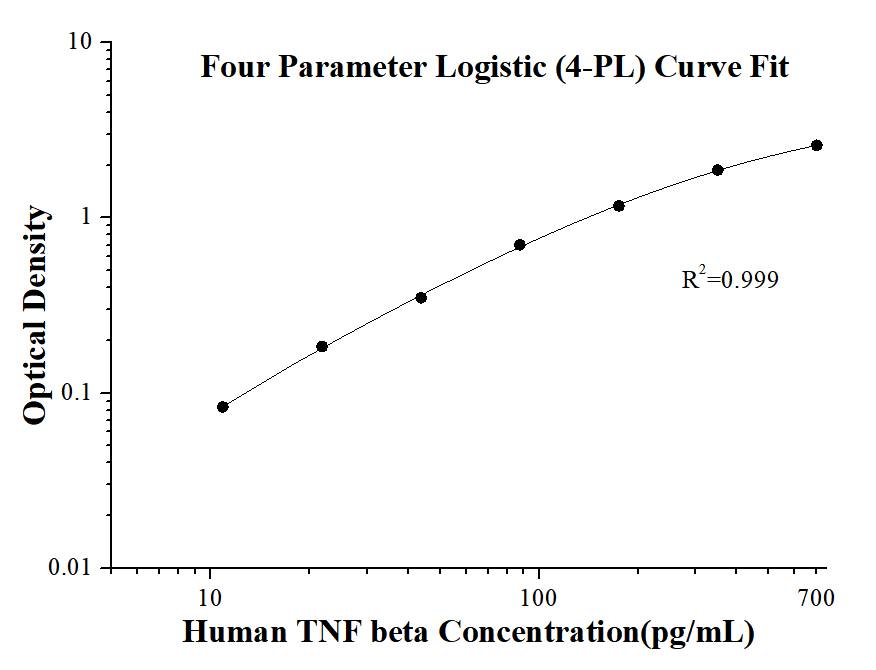Human TNF beta ELISA Kit
Sensitivity
0.4 pg/mL
Range
10.94-700 pg/mL
Reactivity
Human
Validation Data Gallery
Product Information
KE00386 is a solid phase sandwich Enzyme Linked-Immuno-Sorbent Assay (Sandwich ELISA). The human TNF beta ELISA kit is to be used to detect and quantify protein levels of endogenous human TNF beta. The assay recognizes human TNF beta. An antibody specific for human TNF beta has been pre-coated onto the microwells. The human TNF beta protein in samples is captured by the coated antibody after incubation. Following extensive washing, another horseradish peroxidase (HRP)-conjugated antibody specific for human TNF beta is added to detect the captured human TNF beta protein. For signal development, followed by Tetramethyl-benzidine (TMB) reagent. Solution containing sulfuric acid is used to stop color development and the color intensity which is proportional to the quantity of bound protein is measurable at 450 nm with the correction wavelength set at 630 nm.
| Product name | Human TNF beta ELISA Kit |
| Tests | 1 X 96 well plate |
| Sample type | Cell culture supernatant |
| Assay type | Sandwich |
| Sensitivity | 0.4 pg/mL |
| Range | 10.94-700 pg/mL |
| Reactivity | Human |
| Tested applications | Sandwich ELISA |
| Gene ID (NCBI) | 4049 |
Recovery
| Sample Type | Average | Range |
|---|---|---|
| Cell culture supernatant | 101% | 80%-128% |
IntraAssay
| Sample | n | mean ( pg/mL) | SD | CV% |
|---|---|---|---|---|
| 1 | 20 | 377.7 | 18.5 | 4.9 |
| 2 | 20 | 90.8 | 4.2 | 4.7 |
| 3 | 20 | 22.1 | 1.3 | 5.7 |
InterAssay
| Sample | n | mean ( pg/mL) | SD | CV% |
|---|---|---|---|---|
| 1 | 24 | 346.0 | 18.8 | 5.4 |
| 2 | 24 | 82.0 | 5.1 | 6.2 |
| 3 | 24 | 19.2 | 1.6 | 8.2 |
Background Information
TNF beta also known as lymphotoxin alpha (LTA), is a member of the tumor necrosis factor family, and is a cytokine produced by lymphocytes. TNF beta is highly inducible, secreted, and forms heterotrimers with lymphotoxin-beta which anchor lymphotoxin-alpha to the cell surface. TNF beta also mediates a large variety of inflammatory, immunostimulatory, and antiviral responses, is involved in the formation of secondary lymphoid organs during development and plays a role in apoptosis.
Properties
| Storage Instructions | All the reagents are stored at 2-8℃ for 6 months or -20℃ for 12 months. Refer to the protocol for further storage instructions. |
| Synonyms |
